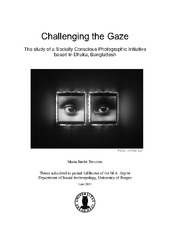| dc.description.abstract | The aim of this thesis is to consider the real life interplay between ambitions and restrictions to aDhaka based photographic initiative, with the core objective to contest stereotypicalrepresentations of Bangladesh in Western mainstream media.To what extent it is possible to rebel against stigmatizing categories and gain control ofone’s own image through photographic means? In which ways do financial restrictions within thephotographic field influence the ambition to break with stereotypical representations, and whatare the constraints attached to the photographic medium itself? I carried out six months offieldwork in the photographic community in Dhaka where I, with a combination of observationaland conversational methods, investigated these questions. In contrast to much of the existingmaterial on photography and politics of representation, this study shows how stereotypicalrepresentations and dominant discourses are negotiated and re-appropriated by ‘Others’, in thepast depicted principally by Western photographers. As such it contributes to the understandingof representation, visual culture, resistance and development.The material presented shed light on the contradictory forces that influence Bangladeshiphotographers affiliated to the agency in their daily practices. On the one hand, localphotographers are inspired to create a new envisioning of Bangladesh, by emphasizing differenttopics and storylines than the well-known portrayals of a materially poor, catastrophe-hit and aiddependantcountry. In this sense photographs are used as an act of resistance and a vehicle forchange. At the same time photographers in Dhaka are reliant upon the same image markets asphotographers worldwide, and non-governmental organisations and other ‘development’ agentsform a substantial part of the available image market. Driven by a negative news agenda and theneed to raise aid, market forces have a tendency to push photographers in the opposite direction.Thus, a number of tensions arise whereby the photographic agency and individual photographersare pulled between idealistic considerations and financial concerns, resistance and resignation. The material explored indicates that while there is a potential for self-representation in thephotograph, there are limitations to the photograph’s ability to free itself entirely from existingrepresentations. There is a risk, as Larsen (1999) has termed it, of being captured by the languageof ones’ opponent when attempting to ‘resist’ the dominant order. I argue that the photographiccommunity in Dhaka needs to accept a certain amount of stereotypical, or ‘Orientalist’ depictionsin order to create a space for alternative visions. This is not only due to the restrictions caused bymarket demands and the limited freedom photographers face, but also because of the boundariesof the photograph itself. This paper examines how photographers question and reflect upon, andtry to find the cracks within, the practical constraints that they encounter. I further argue that theextent to which a photographer succeeds in his or her endeavour to contest stereotypicalrepresentations depends on a number of factors, including their social and economicbackgrounds. While the initiative contest global hierarchies, I argue that continuity can be tracedbetween the global disparities in the international media field and those that characterise thecontemporary Bangladeshi photography-scene. | en_US |
